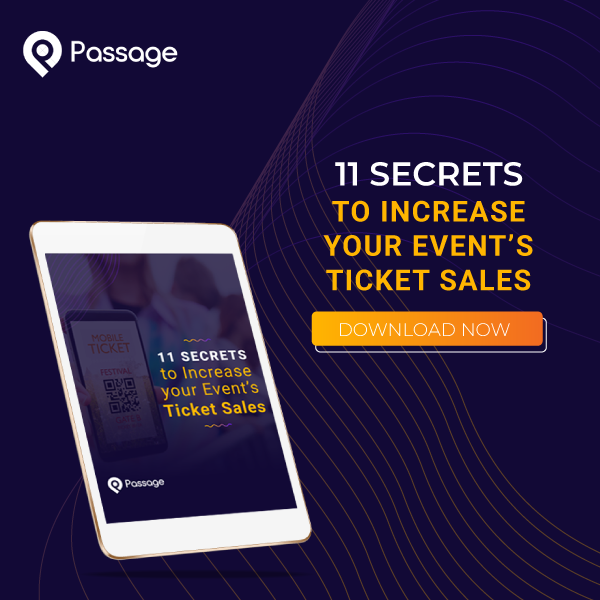The key to a sold-out event starts with the right ticket price. There’s a sweet spot that makes ticket prices attractive to guests and also allows you to earn a profit on your event.
Whether you’re planning a brand new event or reevaluating your existing event’s pricing strategy, this article will help answer the questions:
- How much should I charge for tickets?
- What are the different pricing models and which one is right for my event?
- When should I offer a discount? Who gets one?
- What upgrades can I offer to increase revenue?
Finding the right price starts with identifying a pricing model. That is, the type of admission you’ll offer and what that includes. Some events choose to charge one price for an all-you-can-enjoy model. Others let guests pick and choose which experiences they want to pay for. Neither one is right or wrong, it’s about finding the model that fits best for your event.

Start by calculating your costs
Many event producers determine their ticket price using a Cost-Plus model. Take a look at your total event budget, and be sure to consider variable costs like food & beverages, staffing, and marketing & advertising costs into the equation in addition to hard costs like the venue rental.
Then, consider how many guests you expect will attend; take the capacity of your venue into account.
This is an overly simplified example, but let’s say your event will cost $1,000 to produce and you expect 100 guests to attend. If you charged $10 per ticket you would just break even enough to cover your costs. Of course, that doesn’t take into account revenue you might earn from VIP tickets, or in-event sales and add-ons, but we’ll get into those later.
Compare ticket prices of similar events
This is called competitor-based pricing. Find events in your area with a similar format to yours and see what they’re charging. Your ticket price might be a little higher or a little lower, but if it’s within 5% of your competitor’s event you’re probably good.
Ultimately, to determine the right price for your event you need to ask: What are guests willing to pay?
What we’re really asking is what is my event worth? Guests need to see the value in your ticket price when they choose to spend money on your event instead of another experience or just staying home.
Using the right pricing model can help improve the perceived value of your event. For example, hosting an all-inclusive event might allow you to charge a higher ticket price, but guests might also feel like they need to overindulge in the freebies to make up for the cost of admission. Some events choose to offer free admission: who wouldn’t see the value in that? But it can backfire if guests think the event isn’t worth their time.
There are pros and cons to each model.
Read on as we break down four common pricing models and which types of events they work best for.
Free Admission
You might be wondering why on earth you’d host a free event. How will you make money if guests aren’t paying admission?
Free admission can be very appealing if your event offers a lot of paid extras within the experience. For example, a food & wine festival where guests choose which eats & drinks they wish to purchase. If you’re earning a cut of those sales from vendors, getting more people through the door might be more profitable than charging an entry fee.
This option can also work nicely for outdoor events without clearly defined boundaries, or when you want to allow guests to come and go as they please throughout the day and night. However, you’ll need to consider your overhead before offering free admission. Will you be able to cover your costs through profits from your vendors alone?
Free Admission might be right for you if:
- Your event has multiple entrances and allows for re-entry throughout the day/weekend/week.
- You have diverse vendors (think: a mix of food, drinks, and merch) who want to set their own pricing, and you’re earning a portion of each sale.
- Your up-front costs are relatively low and you’re comfortable generating all of your revenue the day of the event.
You can still capture guest registrations with a free event! This will help you remarket to them so you can invite them back next year, or sell them tickets to your next paid event. Schedule a demo to see how Passage can help you do that.
2. Entry Fee + Pay per Attraction/ExperiencePay-per-Attraction
Charging admission to your event doesn’t have to mean a one-price-fits-all model. You can still offer guests some flexibility by charging a small fee for event admission and then selling admission to various attractions within your event.
Some events handle this with credit card swipers at each attraction, while others have a central “ticket” booth or two, where guests purchase paper tickets which can then be redeemed for entry into the different attractions. Which option you choose depends on your event’s details.
Pay-per-Attraction might be right for you if:
- You can easily control the flow of traffic in and out of your venue.
- Your event offers multiple experiences.
- Your venue has a midway with games or other diversions.
- You’re hosting a festival that takes place all day or spans more than one day.
- You’re hosting an event with live entertainment and want to charge guests for entry, even if they don’t experience any other attractions.
Bundles can be a great way to earn more revenue and make things simple for guests who want to experience everything your event has to offer. Schedule a demo to see how bundled tickets work with Passage.
3. All-Inclusive + VIP Upgrades
All-inclusive packages are appealing because of the convenience factor. As a guest, you know exactly what you’re paying up front. Then you can just kick back and enjoy yourself at the event. You don’t feel nickel and dimed over every plate of food, attraction, or game.
For event hosts, all-inclusive has its benefits, too. Calculating and managing your event’s budget is much simpler with this model. If most of your tickets are sold in advance of your event, you’ll be able to see how much revenue you have coming in and plan how to cover your expenses.
An all-inclusive pricing model doesn’t have to mean you only offer guests one ticket option. You can still give them an opportunity to upgrade to a VIP area – maybe a lounge with its own bar and comfy seating, seating closer to the stage, skip-the-line access to attractions, or other perks.
All-Inclusive might be right for you if:
- Your event has a specific time frame (e.g. 7 p.m. to midnight or noon to 6 p.m.)
- You expect most of your ticket sales to take place in advance.

4. Pay-What-You-Can
Letting guests decide what your event is worth is tricky. What if they think your event is worth less than what you think? Will you still be able to cover your costs?
Pay-what-you-can pricing is becoming more popular these days. It can give you incredible insight into how your audience perceives your event and its value. This can be useful for pricing future paid events.
Pay-what-you-can pricing has other benefits, too. For theaters, sports arenas, and other venues, it can be a good way to get customers in your seats on slow nights. You get to introduce your event to guests who may not otherwise have attended in the past. If they enjoy themselves, they may come back on a night with higher ticket prices.
For nonprofit events, pay-what-you-can encourages donors to give a little extra if the proceeds are benefiting a charity they support. You might set a minimum price, but it’s completely up to the guest’s discretion what they pay above that.
Pay-What-You-Can might be right for you if:
- You want to be inclusive and let everyone attend regardless of their economic situation.
- You’re offering it as a one-night or one-performance special.
- You’re hosting a charity event that your guests have a strong desire to support.
- Entertainment includes a popular artist or local talent that guests will want to support.
Need help figuring out how much to charge for your event? Unsure which pricing model will work best for you? Schedule a demo with an event expert who will help you figure it all out. We’ll even set up all your ticketing for you!











